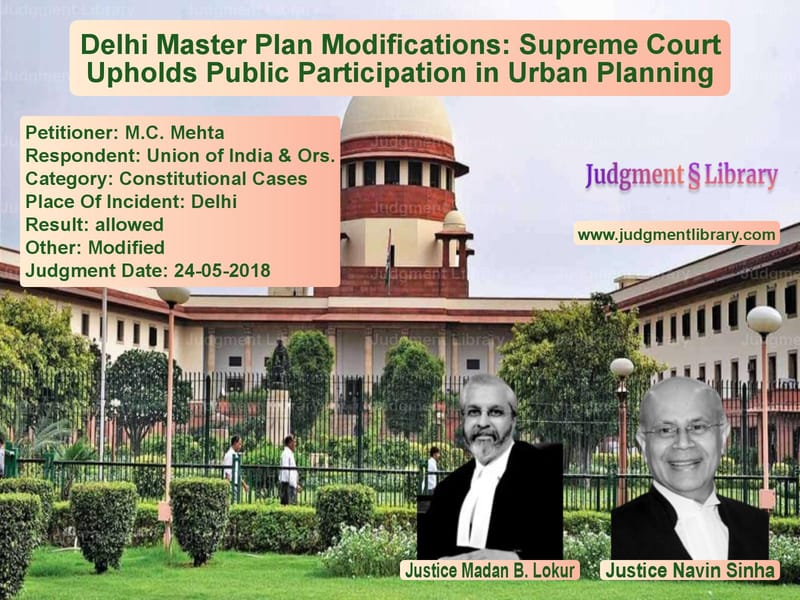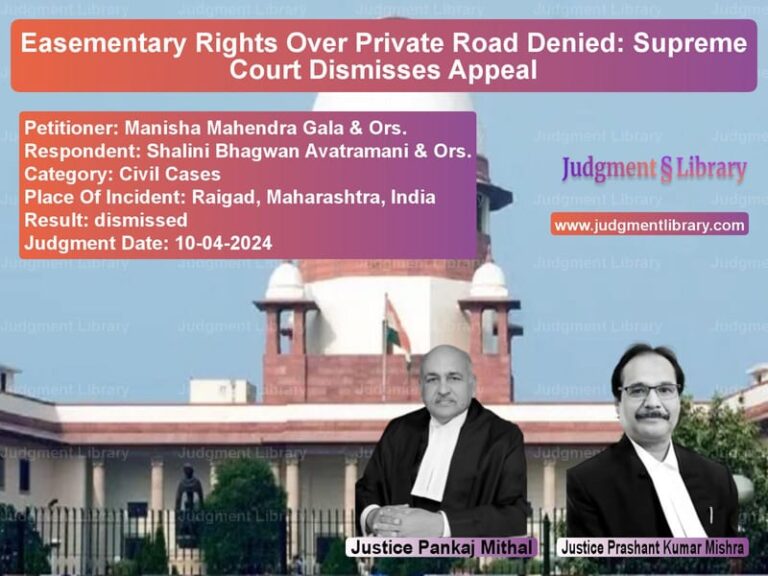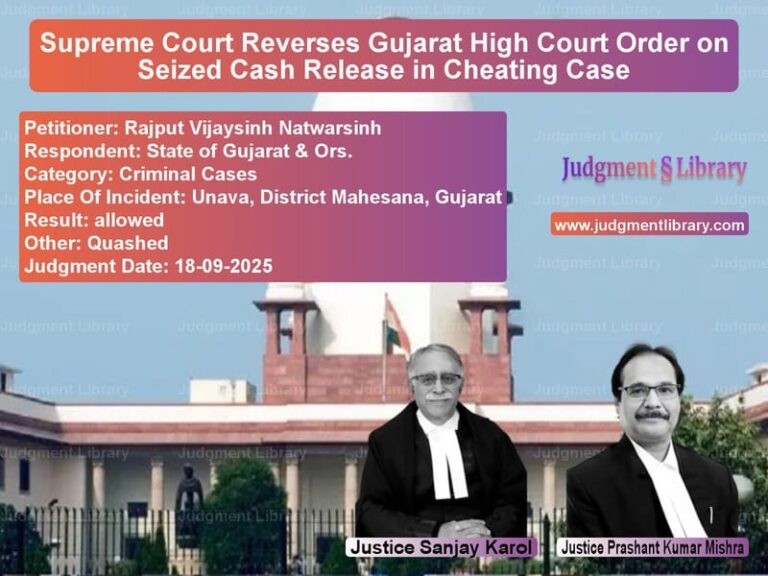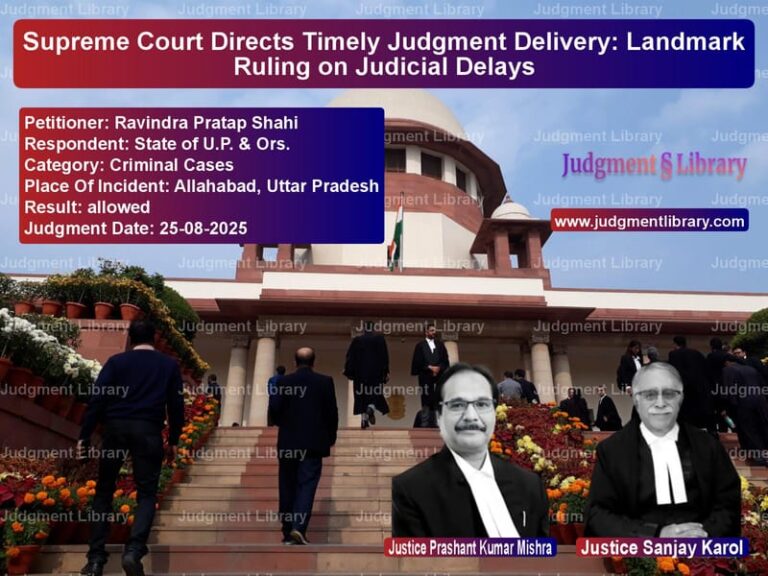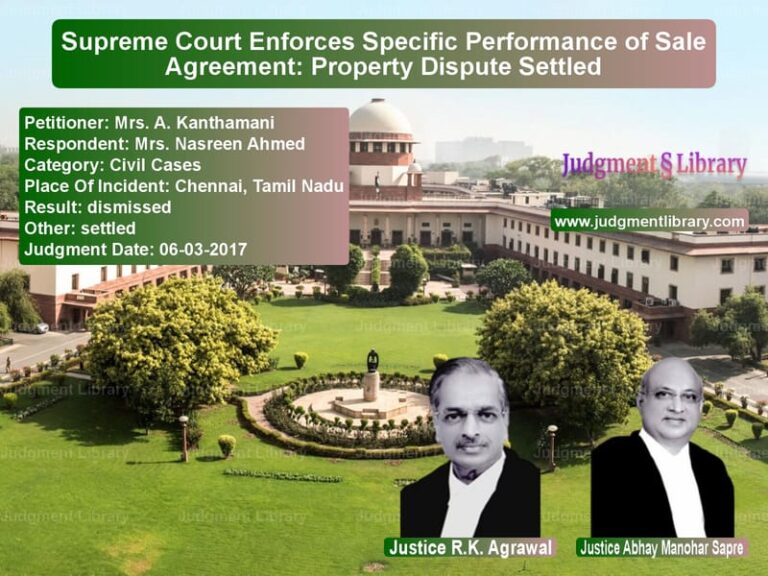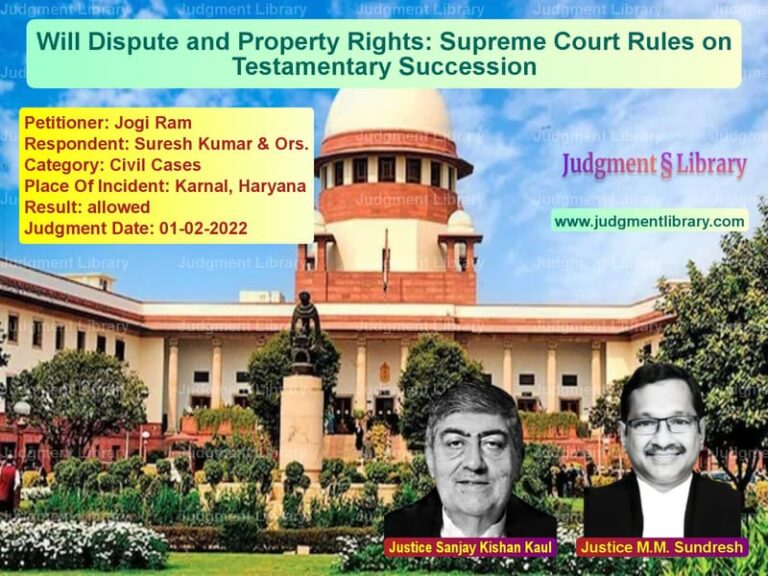Delhi Master Plan Modifications: Supreme Court Upholds Public Participation in Urban Planning
The case of M.C. Mehta vs. Union of India & Ors. is a landmark judgment concerning urban development and the rights of citizens to participate in city planning. The Supreme Court was called upon to address the arbitrary reduction of the time for public objections and suggestions regarding modifications to the Master Plan for Delhi. This judgment reaffirms the importance of transparency and public participation in decisions that shape the future of cities.
Background of the Case
The Delhi Development Authority (DDA) sought to amend the Master Plan for Delhi under the provisions of the Delhi Development Act, 1957. Typically, such modifications require public notice and an opportunity for citizens to submit objections and suggestions. As per Rule 5 of the Delhi Development (Master Plan and Zonal Development Plan) Rules, 1959, this period was originally set at 90 days.
However, in an unexpected move, the Ministry of Housing and Urban Affairs issued a notification on January 31, 2018, drastically reducing this period to only 3 days. This significant curtailment was justified by the government on the grounds of maintaining public order and responding to exigencies.
This led to public outcry and legal intervention, with the Supreme Court stepping in to examine the rationale behind such an abrupt decision.
Legal Issues Raised
1. Reduction in Public Notice Period
The primary legal issue was whether the Central Government was justified in reducing the public notice period from 90 days to just 3 days. The petitioner contended that such a move violated the fundamental principles of public participation and transparency in governance.
2. Public Order Justification
The government argued that the reduced notice period was necessary due to concerns about public order disturbances and riots in Delhi. However, no concrete evidence, such as police reports or FIRs, was provided to substantiate these claims.
3. Meaningful Public Participation
The Supreme Court was also tasked with determining whether the process followed by the DDA, which included an extension of two additional days due to public demand, was adequate to ensure public participation in the decision-making process.
Arguments by the Parties
Petitioner (M.C. Mehta)
- The reduction of the notice period from 90 days to 3 days was arbitrary and violated the right of citizens to participate in urban planning.
- The amendment of the Master Plan for Delhi had far-reaching consequences, and it was imperative to provide adequate time for public objections and suggestions.
- The claim of public order disturbances was baseless, as no evidence of riots or unrest was provided by the government.
- The move appeared to be an attempt to bypass public scrutiny and cater to specific interest groups.
Respondent (Union of India)
- The government justified the urgency by citing concerns about public order and the need to expedite changes to the Master Plan.
- It was argued that the overwhelming response (741 objections and suggestions received within the 5-day period) demonstrated that the reduced timeframe did not significantly hinder public participation.
- Public hearings were conducted on February 9, 10, and 12, 2018, providing objectors with an opportunity to be heard.
- The modifications had been duly approved by the DDA and forwarded to the Ministry of Housing and Urban Affairs for final notification.
Supreme Court’s Observations
The Supreme Court delivered a strong rebuke to the government for attempting to rush through the amendments without due public consultation. The Court emphasized the importance of adhering to democratic principles in urban planning and governance.
1. Arbitrary Reduction of Notice Period
The Court found no justification for reducing the public notice period from 90 days to 3 days. It observed:
“Apart from submitting that there were riots in Delhi, nothing further was stated and not a single instance of any riot in any part of Delhi was pointed out to us nor any FIR placed before us.”
This highlighted the lack of substantial evidence to support the government’s claim of an urgent need to curtail public participation.
2. Public Participation is Essential
Recognizing the high volume of objections submitted within the limited timeframe, the Court stated:
“The overwhelming number of objections and suggestions given over a limited period indicates the concern of the public in Delhi, which is vitally interested in the proposed amendments.”
It further stressed that decisions regarding urban planning must consider the welfare of current and future generations.
3. Role of Civic Authorities
The Court expressed disappointment with the conduct of civic authorities in Delhi, noting:
“Delhi is being ravaged by unauthorized encroachments and illegal constructions with impunity, and none of the civic authorities, including the Delhi Development Authority, was sincerely carrying out its statutory duties.”
This pointed to a broader failure of governance and enforcement mechanisms in the city.
Final Judgment
The Supreme Court rejected the government’s request to modify its earlier order and reinstated a reasonable notice period for public participation. The Court ruled:
“The Central Government should expeditiously implement the order dated 15th May, 2018 in letter and spirit, keeping the interest of the public of Delhi in mind.”
This reaffirmed the citizens’ right to engage in decisions that impact their living environment.
Implications of the Judgment
The Supreme Court’s ruling in this case has significant implications for urban planning and governance in India:
- Strengthens Public Participation: Reaffirms that city planning must involve meaningful public engagement.
- Prevents Arbitrary Decision-Making: Establishes that procedural requirements cannot be bypassed on flimsy grounds.
- Calls for Greater Accountability: Highlights the need for transparency in governance and urban development.
- Ensures Judicial Oversight: Demonstrates the judiciary’s role in upholding democratic values and preventing undue government interference.
Conclusion
The case of M.C. Mehta vs. Union of India & Ors. is a landmark ruling that underscores the fundamental role of public participation in urban planning. By striking down the arbitrary reduction of the notice period for objections and suggestions, the Supreme Court reaffirmed that governance must be transparent, accountable, and inclusive. The ruling serves as a reminder that the interests of citizens should take precedence over bureaucratic expediency and that democratic principles must guide urban development policies.
Petitioner Name: M.C. Mehta.Respondent Name: Union of India & Ors..Judgment By: Justice Madan B. Lokur, Justice Navin Sinha.Place Of Incident: Delhi.Judgment Date: 24-05-2018.
Don’t miss out on the full details! Download the complete judgment in PDF format below and gain valuable insights instantly!
Download Judgment: M.C. Mehta vs Union of India & Ors Supreme Court of India Judgment Dated 24-05-2018.pdf
Direct Downlaod Judgment: Direct downlaod this Judgment
See all petitions in Public Interest Litigation
See all petitions in Constitution Interpretation
See all petitions in Legislative Powers
See all petitions in Judgment by Madan B. Lokur
See all petitions in Judgment by Navin Sinha
See all petitions in allowed
See all petitions in Modified
See all petitions in supreme court of India judgments May 2018
See all petitions in 2018 judgments
See all posts in Constitutional Cases Category
See all allowed petitions in Constitutional Cases Category
See all Dismissed petitions in Constitutional Cases Category
See all partially allowed petitions in Constitutional Cases Category

